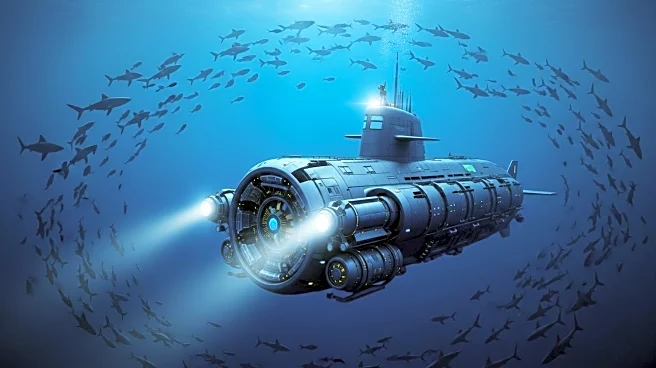What's Happening?
The iconic film 'Jaws,' which first premiered in 1975, is credited with inspiring a wave of interest in shark biology and research. As the movie celebrates its 50th anniversary, it is being re-released in theaters, highlighting its cultural impact. Despite initially heightening public fear of sharks, 'Jaws' has had a positive influence on the scientific community, motivating many to study these ancient creatures. Scientists like John Mandelman and Gavin Naylor have noted the film's role in sparking curiosity and advancing our understanding of sharks. Over the past five decades, significant progress has been made in shark research, including discoveries about their genetics, reproduction, and migration patterns. The film's legacy continues to fuel a passion for shark conservation and research, as scientists strive to uncover more about these misunderstood animals.
Why It's Important?
The influence of 'Jaws' on shark research underscores the power of media to shape scientific inquiry and public perception. The film's impact has led to increased awareness and understanding of sharks, which are often misunderstood and feared. This has important implications for conservation efforts, as many shark species face threats from overfishing and environmental changes. By inspiring a new generation of scientists, 'Jaws' has contributed to a deeper appreciation of sharks' ecological roles and the need to protect them. The ongoing research into shark biology not only enhances our knowledge of these creatures but also informs policies aimed at preserving marine biodiversity. As scientists continue to study sharks, they provide valuable insights into the resilience and adaptability of these ancient animals, which have survived multiple extinction events.
What's Next?
As shark research progresses, scientists are likely to focus on understanding the resilience mechanisms that have allowed sharks to survive for millions of years. This could lead to new conservation strategies and policies to protect shark populations from the threats they face today. Additionally, public education efforts may continue to shift perceptions of sharks from fear to fascination, further supporting conservation initiatives. Researchers may also explore the genetic diversity and population dynamics of sharks to better understand their evolutionary history and adaptability. The ongoing dialogue between scientists and the public, fueled by media like 'Jaws,' will be crucial in shaping future conservation efforts and ensuring the survival of these vital marine predators.
Beyond the Headlines
The story of 'Jaws' and its impact on shark research highlights the complex relationship between media, public perception, and scientific inquiry. While the film initially contributed to a fear of sharks, it also sparked a curiosity that has led to significant scientific advancements. This dual impact illustrates the potential for media to both challenge and reinforce societal attitudes towards wildlife. The continued interest in sharks, driven by both scientific and cultural narratives, may lead to a broader understanding of the importance of marine conservation. As researchers uncover more about sharks' resilience and adaptability, these findings could have broader implications for understanding how other species might cope with environmental changes.









